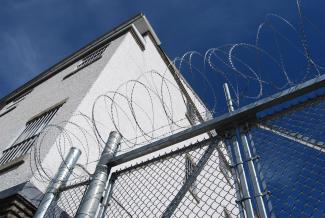
Although Canada enjoys a reputation as a welcoming nation, thousands of migrants are detained here annually – including refugees, children and families.
Once detained, migrants have little recourse to question the legitimacy of their detention and are often left in the dark, sometimes for years on end.
“Immigration detention is a fundamentally flawed regime,” says Dr. Efrat Arbel, Associate Professor at Allard Law. “It's this big house of cards, and the more you dig into it, the more it starts to fall apart.”
Canadian law grants the Canada Border Services Agency (CBSA) broad discretionary powers to arrest and detain non-citizens without acharge, without a trial and without any determination of guilt or innocence. Detainees are not held on criminal charges, yet as many as 8,000 migrants are detained in Canada annually, either in immigration holding centres or in criminal facilities like provincial jails.
In jails, migrants are comingled with the criminal population and can be subjected to some of criminal law’s harshest measures – like shackles, lockdowns and solitary confinement.

“The practice of jailing migrants is one of the most egregious parts of Canada’s immigration detention regime,” says Arbel. “Provincial jails are not intended to be used as a tool of immigration enforcement or border control. They’re designed to hold people who are awaiting trial or serving a criminal sentence. There is simply no justifiable basis – in law or morality – to hold migrants in jail.”
It’s this conviction that led Arbel to work towards ending the practice of jailing detainees.
Shaky grounds for detention
Canada’s immigration detention law empowers the CBSA to arrest and detain non-citizens on several grounds, the most common of which is the suspicion of a “flight risk” – that is, that the migrant in question may not appear for their immigration proceeding.
“The ostensible rationale is that the state has a right to detain migrants to keep them accountable to the CBSA,” Arbel explains. “But detention isn’t necessary in these circumstances,” she says, as the CBSA can instead hold migrants in community placements, where they remain accountable without having their liberty deprived or their human rights violated.
In immigration detention, time is amorphous and not only indeterminate, but potentially infinite – it can quite literally continue forever.
The risk that a migrant will “flee” is also greatly overestimated, according to Arbel. “The vast majority of migrants who arrive in Canada are law compliant. They come here to seek a better life. They want to show up for appointments, and are eager to satisfy the requirements that Canada lays out for them.”
The anguish of uncertainty
Once detained, migrants have limited access to information, which can take an extraordinary toll on their mental health. Many struggle with English and cannot access interpretation services.
Adding to this uncertainty is the fact that Canada’s immigration system has no time limits. That means migrants can get stuck in detention for years, with no end point in sight.
“Under the criminal law, any deprivation of liberty is circumscribed by time,” Arbel notes. “Time is calculated clearly – people ‘do time,’ they get ‘time off’ for good behaviour. In immigration detention, time is amorphous and not only indeterminate, but potentially infinite – it can quite literally continue forever.”
Arbel’s own research on immigration detention and solitary confinement has shown that the damage caused by this indeterminacy is significant. “That kind of uncertainty – the extreme open-endedness of time – wreaks havoc on the human mind,” she explains. “Detainees are suspended in this liminal state. They don’t know how long they will be detained or what they need to do to get out.”
The road ahead
On July 21, 2021, British Columbia announced it would no longer allow the CBSA to detain migrants in the province’s jails, becoming the first Canadian province to put an end to the practice. This decision followed a review by BC Corrections, prompted by the #WelcomeToCanada campaign launched by Amnesty International and Human Rights Watch in October 2021. BC Corrections received input from immigration detainees, organizations like the Office of the BC Human Rights Commissioner, and legal experts such as Arbel.
My hope is that this will trigger a domino effect and send a strong message to the federal government about the fundamental problems that underpin immigration detention and lead to even greater change.
BC’s decision was monumental,” says Arbel. “It was a moment of hope – of possibility – and an important reminder that structural law reform is possible.” Since BC’s announcement, three more provinces have followed suit: Alberta, Manitoba and Nova Scotia.
“My hope is that this will trigger a domino effect and send a strong message to the federal government about the fundamental problems that underpin immigration detention and lead to even greater change,” says Arbel.
While it remains to be seen what the new immigration landscape will look like in provinces that have pledged to end the practice of jailing migrants, Arbel is continuing her work, alongside detainees, activists and human rights organizations, to pressure the federal government to find community-based alternatives to detention.
“I’m grateful for the courage of my colleagues who have experienced immigration detention and who continue to fight to right the wrongs they experienced. It’s their strength, their tenacity, that is at the heart of this work.”
In March 2022, Professor Efrat Arbel was awarded a Killam Accelerator Research Fellowship, one of UBC’s most prestigious awards, for a two-year study analyzing the inner workings of Canada’s immigration detention regime. In May 2022, through collaboration with her community partners, she was a recipient of the inaugural SSHRC Race, Gender, and Diversity Initiative award to undertake research focused on race and racism in immigration detention.


